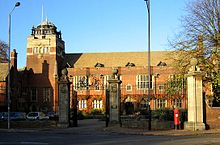- Westminster College, Cambridge
-
Westminster College in Cambridge is a theological college of the United Reformed Church, formerly the Presbyterian Church of England. Its principal purpose is the training of clergy for ordination, but is also used more widely for training within the denomination. The current Principal of the college is the Revd Dr Susan Durber, and the Vice-Principal and Director of Studies is the Revd John Proctor.
Contents
History
The college was founded in London in 1844 with a temporary home in the Exeter Hall before moving to permanent premises in Queen's Square, London in 1859. It then moved to Cambridge in 1899 following the gift of a prime site of land near the centre of the city by two Scottish sisters, Agnes Smith Lewis and Margaret Dunlop Gibson, both noted biblical scholars. Following an appeal for funds from the wider Presbyterian congregation, the college commissioned a new building designed by Henry Hare and built between 1897–1899. In 1967 the college began to amalgamate with Cheshunt College, Cambridge, presaging the union of the Congregational and Presbyterian churches to form the United Reformed Church in 1972.
Notable former students include Thomas Walter Manson, the biblical scholar and Rylands Professor in the University of Manchester; Lesslie Newbigin, ecumenist, bishop, scholar and pioneer of the Church of South India; William Paton, a precursor to Newbigin and a seminal figure in modern ecumenism; and W. D. Davies, known for his work on Paul and his Jewish background.
Lewis and Gibson
Agnes Smith Lewis and Margaret Dunlop Gibson were noted for their study of one of the earliest versions of the Old Gospels in Syriac Sinaiticus discovered in the monastery St. Catherine, Mount Sinai. The other important contributions to the field of Aramaic and Theology are the publications of the Codex Climaci Rescriptus, a 6th century palimpsest written in Christian Palestinian Aramaic which contains portions of the Old Testament and New Testament,[1] and another palimpsest manuscript of the Forty Martyrs of the Sinai desert and the Story of Eulogios, the Stone Cutter in the same Aramaic dialect. The sisters found the manuscripts in the antiquities market of Cairo and acquired them for the library in Westminster College. They edited also many other important manuscripts in Syriac and Arabic.
In 1897 Lewis and Gibson also found and purchased some fragments of parchment of the Cairo Genizah whilst travelling in the Middle East. With the support of Solomon Schechter they made several more trips to the Middle East, locating the majority of the Genizah at the Ben Ezra Synagogue in Cairo. Schechter identified the fragments as forming part of the Hebrew Wisdom of Sirach.[2]
Today
The college is not part of the University of Cambridge, but is united with six other religious colleges in Cambridge to form the Cambridge Theological Federation which is affiliated with the university. In concentrating on religious studies for training clergy, the college is in some ways closer to the original conception of the main university colleges when they were founded.
Currently, Westminster has connected with it around 50 students; some in training for ministry in the United Reformed Church, and some studying for other work or pleasure. Westminster is served by 5 academic staff, covering the traditional theological disciplines of Systematic Theology, Church History, Old Testament Studies, New Testament Studies and Pastoral Studies. Traditionally, most students have studied for four years, which includes an internship year working in a local church. However, the College now trains many students part-time and via distance learning, as well as through full-time in-house courses. Most students still work, nonetheless, either for a BA or MA degree (validated by Anglia Ruskin University) or a BTh or BA/Tripos degree (validated by Cambridge University).
Future plans
The college is exploring the ways in which its buildings can be adapted to fit its role as a Resource Centre for Learning within the United Reformed Church and provide some of the facilities needed by the Cambridge Theological Federation.
References
- ^ [1] at the Leuven Database of Ancient Books
- ^ Taylor-Schechter Genizah - A Priceless Collection
External links
Coordinates: 52°12′37″N 0°06′43″E / 52.210366°N 0.111933°E
Categories:- Bible colleges, seminaries and theological colleges in England
- Education in Cambridge
- Reformed church seminaries and theological colleges
- Presbyterianism in England
Wikimedia Foundation. 2010.

